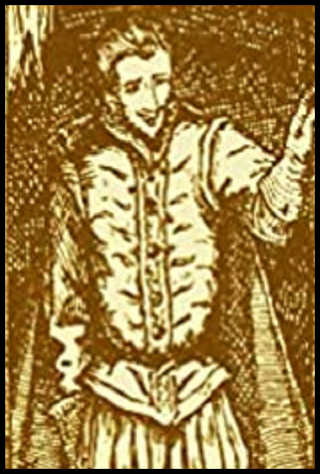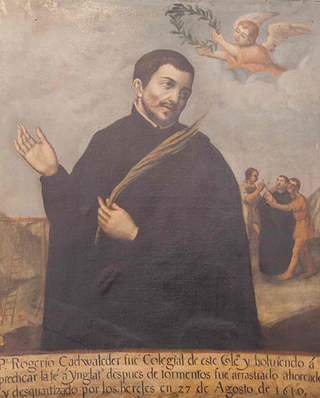This article relies largely or entirely on a single source .(April 2022) |
John Bridgewater was an English clerical historian of the Catholic Confessors under Queen Elizabeth I.
This article relies largely or entirely on a single source .(April 2022) |
John Bridgewater was an English clerical historian of the Catholic Confessors under Queen Elizabeth I.
Bridgewater was born in Yorkshire about 1532; died probably at Trier, about 1596. He proceeded M. A. at Oxford University in 1556, [1] was ordained priest, and in 1563 became Rector of Lincoln College in that university. In 1574, he resigned these and several other important preferments, and crossed over to Douai along with several of his students, in order to practice Catholicism more freely. [2]
He probably never returned to England but lived at various Catholic places on the European continent (Reims, Paris, Rome, Trier); in 1588 and 1594 he resided at Trier. Pedro de Ribadeneira, Nathaniel Bacon, and Henry Foley account him a member of the Society of Jesus; the Catholic Encyclopedia argues that they have no proof of this. [3]
Bridgewater refuted (Trier 1589) a Protestant work on the pope as Antichrist and also wrote "Account of the Six Articles usually Proposed to the Missioners that Suffered in England", and against which he voted in 1562. [ clarification needed ]
He may be best known as the earliest martyrologist of Catholic England. His work, conceived in the spirit of Eusebius as a triumphant apology for Catholicism, is entitled Concertatio Ecclesliae Catholicae in Angliâ adversus Calvinopapistas et Puritanos sub Elizabethâ Reginâ quorundam hominum doctrina et sanctitate illustrium renovata et recognita, etc., i.e. The Battle of the Catholic Faith in England under Queen Elizabeth, renewed in the lives of certain men illustrious for learning and sanctity, among them more than one hundred martyrs, and a very great number of others distinguished for their (religious) deeds and sufferings; confirmed also by the retractations of apostates, by new edicts of the persecutors, and by the writings of very learned Catholics against the Anglican, or rather female, pontificate, and in defense of the authority of the Roman pontiff over Christian princes (Trier, 1588, about 850 pp. in octavo).
Another edition was brought out by William Allen in 1594; it served thenceforth as an original record of the persecutions of English Catholics. Hugh Tootell, Richard Challoner, and John Lingard draw on it extensively for biographical and historical data. Its rather miscellaneous contents are described in the Chetham Society's Remains (XLVIII, 47-50). [2]

William Allen, also known as Guilielmus Alanus or Gulielmus Alanus, was an English Cardinal of the Roman Catholic Church. He was an ordained priest, but was never a bishop. His main role was setting up colleges to train English missionary priests with the mission of returning secretly to England to keep Roman Catholicism alive there. Allen assisted in the planning of the Spanish Armada's attempted invasion of England in 1588. It failed badly, but if it had succeeded he would probably have been made Archbishop of Canterbury and Lord Chancellor. The Douai-Rheims Bible, a complete translation into English from Latin, was printed under Allen's orders. His activities were part of the Counter Reformation, but they led to an intense response in England and in Ireland. He advised and recommended Pope Pius V to pronounce Elizabeth I deposed. After the Pope declared her excommunicated and deposed, Elizabeth intensified the persecution of her Roman Catholic religious opponents.

John Boste is a saint in the Catholic Church, and one of the Forty Martyrs of England and Wales.
The Dryburne Martyrs: Richard Hill, Richard Holiday, John Hogg and Edmund Duke were English Roman Catholic priests and martyrs, executed at Dryburne, County Durham, in the reign of Elizabeth I. They were beatified by Pope John Paul II in 1987.
Thomas Worthington, D.D. was an English Catholic priest and third President of Douai College.
Gilbert Bourne was the last Roman Catholic Bishop of Bath and Wells, England.
Christopher Bales, also spelt Christopher Bayles, alias Christopher Evers (c.1564–1590), was an English Catholic priest and martyr. He was beatified in 1929.

Thomas Stapleton was an English Catholic priest and controversialist.
Edward Waterson was an English Catholic priest and martyr. He served the hidden Catholics in England during the reign of Elizabeth I. Edward was arrested in 1593 and executed at Newcastle upon Tyne. He was beatified in 1929.
John Pibush was an English Catholic priest. He is a Catholic martyr, beatified in 1929.
Thomas Pormort was an English Roman Catholic priest. He was beatified in 1987.
George Beesley was an English Roman Catholic priest. He is a Catholic martyr, beatified in 1987.

Roger Cadwallador was a Roman Catholic priest. He is a Catholic martyr, beatified in 1987.
Thomas Atkinson was an English Roman Catholic priest. He is a Catholic martyr, beatified in 1987.
John Gibbons SJ was an English Jesuit theologian and controversialist.
John Fenn was an English Roman Catholic priest and writer, in exile under Elizabeth I of England. He was the elder brother of James Fenn, the Catholic martyr, and Robert Fenn.
John Mush was an English Roman Catholic priest, the confessor to Margaret Clitherow.

Robert Drury (1567–1607) was an English Roman Catholic priest, executed for treason. He is a Catholic martyr, beatified in 1987.

The Oaten Hill Martyrs were Catholic Martyrs who were executed by hanging, drawing and quartering at Oaten Hill, Canterbury, on 1 October 1588. The gallows had been put up in 1576. These four were beatified by Pope Pius XI in 1929.
The English College, Lisbon was a Roman Catholic seminary that existed from the 17th century to the 20th century.
The Wisbech Stirs was a divisive quarrel between English Roman Catholic clergy held prisoner in Wisbech Castle in the Isle of Ely, Cambridgeshire, towards the end of the reign of Elizabeth I of England. It set some of the secular clergy against the regular clergy represented by the Society of Jesus, the religious institute that was emerging as clerical leaders, and who wished for a more ordered communal life in the prison.